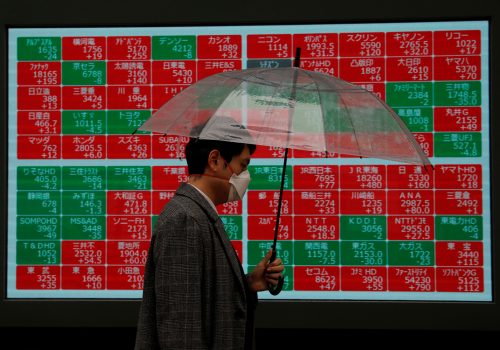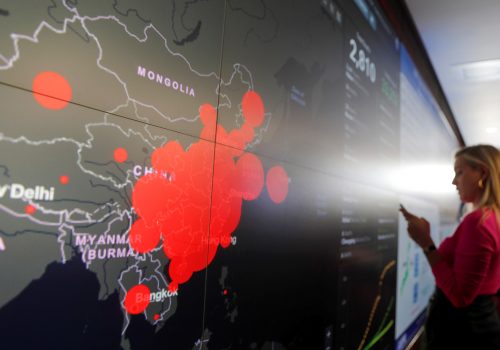CORONAVIRUS ALERT: 3/3/2020
The Atlantic Council’s Coronavirus Alert is a regular summary of policy, economic, and business events around the emergency. To stay updated, email coronavirus@atlanticcouncil.org with “Subscribe” in the subject line.
Summary:
Global finance authorities are showing willingness to support economies as the risks of slowing growth emerge, including interest rate cuts. More companies put in place travel bans or other measures to limit social interaction, as they ramped up home working and virtual meetings.
Statistics:
There are more than 90,000 cases worldwide in more than seventy countries; More than 3,000 people have died.
QUOTE: “Should the virus reach extreme levels of infection globally, it would very likely be the first true test of the 21st-century way of life, laying bare the hidden fragility of a system that has long felt seamless.” Charlie Warzel, writing in the New York Times.
Press & Members Call: The Global, domestic, and local impacts of the Coronavirus. Wednesday, March 4, 2:00 p.m. ET to 3:00 p.m. ET. Please join Thomas Bossert, Leland Miller, Chris Snider, and Barry Pavel as they unpack the latest on the response to the coronavirus and its deepening impacts. Media should email press@atlanticcouncil.org for details.
HEALTH AND SCIENCE:
- The epidemic slowed in China, which reported its lowest number of new cases in a month. In South Korea, the number of those infected grew to 4,800. The situation in Iran is unclear. “In less than two weeks the number of confirmed cases of coronavirus in Iran has jumped from two to more than 1,500, shaking public trust in the Iranian regime’s capacity to contain the disease and exacerbating the country’s economic isolation,” the FT reports.
- Six people have now died in the United States—all in Washington state. There are also cases in Oregon, New York City, California, Illinois, Wisconsin, New Hampshire, Georgia, Rhode Island, Texas, Arizona, and Florida. US Vice President Mike Pence said “The risk remains low” at a news conference in Washington, and said treatments could be available in two months.
- The UK has published its coronavirus plan. “In a stretching scenario, it is possible that up to one-fifth of six employees may be absent from work during peak weeks,” it says.
- The US Food and Drug Administration acted to help ease the supply of respirators. “In a joint effort, the US Food and Drug Administration and the Centers for Disease Control and Prevention took action to make more respirators, including certain N95s, available to health care personnel. Currently, the majority of respirators on the market are indicated for use in industrial settings.”
- The news service Stat reviews vaccines and other drugs under development for coronavirus. “Drug makers large and small have scrambled to advance their best ideas for thwarting a pandemic,” it says.
QUOTE: “We are in uncharted territory. We have never before seen a respiratory pathogen that is capable of community transmission, but which can also be contained with the right measures. If this was an influenza epidemic, we would have expected to see widespread community transmission across the globe by now, and efforts to slow it down or contain it would not be feasible. But containment of COVID-19 is feasible and must remain the top priority for all countries.” Dr. Tedros Adhanom Ghebreyesus, WHO Director-General’s opening remarks at the media briefing
FINANCE AND ECONOMICS:
- The US Federal Reserve cut interest rates by half a percentage point, saying that “the coronavirus poses evolving risks to economic activity.” The White House’s National Economic Council is planning an interagency meeting Tuesday afternoon, including discussion of an emergency economic response. Congress is planning a $7.5 billion emergency spending bill.
- The International Monetary Fund and the World Bank issued a joint statement on the emergency, pledging support for countries in trouble. And Group of Seven (G7) Finance Ministers plan a call today.
- “It is important that Group of Twenty (G20) leaders rise to the occasion like they did at the Pittsburgh G20 Summit in 2009 to articulate a joint plan of action to address the crisis,” argues the Atlantic Council’s Hung Tran. “This should contain measures to intensify scientific cooperation to develop a vaccine and coordinated economic steps to stabilize the global economy.”
- McKinsey says that “in our base-case scenario…continued spread within established complexes, as well as community transmission in new complexes, drives a 0.3- to 0.7-percentage-point reduction in global GDP growth for 2020.” This is in line with the OECD’s forecast. “Our pessimistic scenario assumes that the virus is not highly seasonal, and that cases continue to grow throughout 2020. This scenario would see significant impact on economic growth throughout 2020, resulting in a global recession.”
QUOTE: “International cooperation is essential to deal with the health and economic impact of the COVID-19 virus. The IMF and the World Bank Group are fully committed to provide the support that people in our member countries expect from us.” Joint statement from the IMF and World Bank
BUSINESS AND TRAVEL:
- Twitter has encouraged all employees to work from home. The Verge reports that Facebook is restricting social visits to its physical offices and is conducting job interviews mostly via video conferencing in the near term. Facebook’s landmark developer conference, F8, has been replaced with “locally hosted events, videos, and live-streamed content.”
- Amazon said it had removed more than 1 million products from its site that were artificially raising prices or falsely advertising effectiveness against coronavirus. Price gouging is a problem as supplies of goods like face masks and hand sanitizer runs low.
- The South By Southwest (SXSW) music and tech festival in Texas said it would proceed as usual despite the withdrawal of some companies including Twitter and Facebook. “SXSW is working closely on a daily basis with local, state, and federal agencies to plan for a safe event. As a result of this dialogue and the recommendations of Austin Public Health, the 2020 event is proceeding with safety as a top priority,” it said.
- The Wall Street Journal focuses on how corporate technology managers are playing an increasing role as remote working and videoconferencing become critical. “Chief information officers are leading efforts to keep their businesses humming as the coronavirus outbreak spreads, reflecting companies’ reliance on technology for daily operations. Much of the focus is on ensuring remote-work applications and platforms are allowing employees to connect amid travel bans, office closures, and home quarantines. But senior IT leaders are also finding that they have a pivotal role in crafting broader contingency plans, CIOs and industry analysts say.
QUOTE: “Our goal is to lower the probability of the spread of the COVID-19 coronavirus for us—and the world around us. We are operating out of an abundance of caution and the utmost dedication to keeping our Tweeps healthy.” Twitter statement.
RESOURCES:
- Johns Hopkins University interactive web-based dashboard to visualize and track reported cases in real-time.
- CDC provides frequent updates and background information on Coronavirus.
- The World Health Organization daily situation reports.
- Harvard Business Review guidance on managing the emergency for corporate decisionmakers.
- The Society for Human Resource Management resources on managing communicable diseases.
- The Wall Street Journal has a useful guide for travel and travel insurance.
- State Department Travel Advisory for China.



